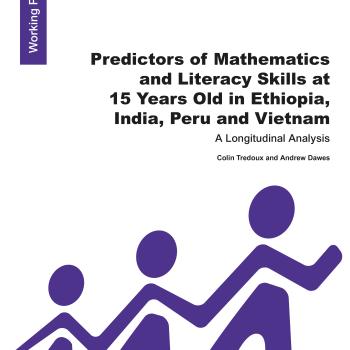Publication Information

This working paper reports on longitudinal analyses of predictors of growth in receptive vocabulary and mathematics abilities by age 15 conducted using data from the Younger Cohort in the four Young Lives countries. Theoretical models of plausible influences on these outcomes were constructed. Latent Growth Modelling undertaken on these two key aspects of development provides unusually powerful cross-country evidence that household economic well-being and proximal relationships in the early childhood environment are particularly important, either placing young children at risk of developmental hazards such as growth stunting or conferring advantage for future development.
The models indicate that children whose mothers are rendered psychologically vulnerable by the stresses of poverty are at risk of poor physical growth in the early years, and that this impacts language, cognition and numeracy skills across childhood. Early disadvantages in poorer children are compounded by challenges of combining household responsibilities with schooling from middle childhood through adolescence. Those children with better-educated mothers are more likely to attend preschool programmes, which contribute to improved learning outcomes. While not directly measured, it is likely that those who made most gains attended programmes that were better provisioned. While there is variation across the countries, the high degree of similarity suggests good external validity of the general findings.

This working paper reports on longitudinal analyses of predictors of growth in receptive vocabulary and mathematics abilities by age 15 conducted using data from the Younger Cohort in the four Young Lives countries. Theoretical models of plausible influences on these outcomes were constructed. Latent Growth Modelling undertaken on these two key aspects of development provides unusually powerful cross-country evidence that household economic well-being and proximal relationships in the early childhood environment are particularly important, either placing young children at risk of developmental hazards such as growth stunting or conferring advantage for future development.
The models indicate that children whose mothers are rendered psychologically vulnerable by the stresses of poverty are at risk of poor physical growth in the early years, and that this impacts language, cognition and numeracy skills across childhood. Early disadvantages in poorer children are compounded by challenges of combining household responsibilities with schooling from middle childhood through adolescence. Those children with better-educated mothers are more likely to attend preschool programmes, which contribute to improved learning outcomes. While not directly measured, it is likely that those who made most gains attended programmes that were better provisioned. While there is variation across the countries, the high degree of similarity suggests good external validity of the general findings.

